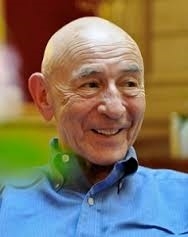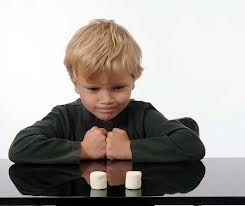 |
| Walter Mischel (http://science.orf.at/stories/1754283/ ()) |
Imagine being four years old again. Now imagine having a big delicious marshmallow placed in front of you and being told you couldn't eat it. That is exactly what Walter Mischel told 100 kids to do while he was conducting his famous marshmallow test. I was introduced to Walter Mischel while walking through Barnes and Noble one day. I was with my little cousin Dane and he picked up the book. He said "Can we get this book? I like marshmallows." So I bought it and went home and started reading it. The book was not about marshmallows so Dane got bored after about two paragraphs, but I was intrigued. I loved how Mischel gave so much insight into the minds of people and did it in a way that was not difficult to understand. Psychology is such a complicated profession and Mischel was able to explain it with such ease and grace that it was hard not to want to pursue psychology as a career myself.
Psychologists have a wide range of different jobs and work environments. Some work with kids in a school setting while others work with troubled adults or in a lab doing experiments like Mischel does. To become a research or clinical psychologist you have a Ph.D. or a doctor of Psychology (Psy.D). According to the Occupational Outlook Handbook, in 2012 the average clinical psychologist make an average of $69,280 a year. While this is a modest salary, psychologists get the opportunity to work directly with their patients and see how much they help the troubled people. Some similar careers are family and marriage counselors, sociologists, social workers and special education teachers. All of these jobs involve knowing how the brain works. They also are all work to help people. Cognitive neuroscience is a huge advancement in psychology. It is described as what the brain is doing when it is thinking. There is a lot known about what part of the brain is doing what when engaged in certain activities. Now people are doing research on what the brain is doing when we are not thinking. By looking at what part of the brain is active when not doing anything, psychologist can learn more about what parts of the brain work together.
Walter Mischel was born in 1930 in Vienna, Austria. His family is Jewish so when he was eight his family fled to the United States after the Germans invaded Austria during World War II. They moved to New York and have lived there ever since. Mischel had two older brothers and his dad owned retail store, and sold cheap household items, which Mischel worked for doing deliveries. He also had four other part time jobs in high school, graduated as valedictorian of his class. This shows how responsible and how hard he had to work to get into college. He didn't stop working hard after he got into college either. He attended Ohio State University and worked under George Kelly and Julian Rotter. They were both highly acclaimed psychologist who had a great influence on Mischel. He graduated with a major in clinical psychology. After he graduated, he worked for the University of Colorado from 1956 to 1958, at Harvard University from 1958 to 1962, and then at Stanford University from 1962 to 1983. Since 1983, Mischel has been in the Department of Psychology at Columbia University. While working at Stanford, he performed the Marshmallow Test. The Marshmallow Test is all about self-control and delayed gratification. Mischel rounded up a group of four year olds and had them sit in a room with a marshmallow in front of them. He then proceeded to tell them that they could eat the marshmallow now or they could wait 15 minutes and then get a bigger prize later. The kids that could wait ended up doing better in high school and beyond. According to CNN's Chuck Hadad who wrote the article "What the 'marshmallow test' can teach you about your kids" the test can "tell you about your child at age 4 could have repercussions for the rest of their lives." This test can tell you so much about your child at such a young age it is almost scary. This test gave parents an insight into their children that was never possible before. After the test was finished, he wrote a book and is now touring and talking about his research and findings.
 |
| Child practicing selfrestraint (http://www.dogonews.com/2012/8/20/how-long-can-you ()) |
Walter Mischel's study on delayed gratification was a huge contribution to psychology. Delayed gratification is being able to resist the immediate reward in turn for a later reward. It generally is associated with resisting a small but immediate reward for a larger reward later. In the case of the Marshmallow Test, the kids were given a marshmallow and were told that if they waited 15 minutes they would get a cookie along with the marshmallow. The kids that waited and didn't need immediate results or praise had higher SAT results. "In short, what gets read, the genes that will and won't be expressed, depends on the enormously complex interactions between biological and environmental influences. The possibilities are endless and the role of the environment essential. Our genetic makeup (i.e., our library) provides a stunningly nimble system for responding to the environment" (Mischel). This quote basically sums up the theme of the book. He is saying that just like other skills, delayed gratification can be learned because it is a characteristic greatly influenced by your environment. I believe this is a relatively new concept introduced by Mischel because up until the 60's, parents thought that once your child has traveled down a negative path, there was no going back. Mischel's experiment proved them wrong.
When I grow up I want to be a psychologist so in high school I am going to take the psychology class. I have a family friend who is a psychologist so I am constantly borrowing his books. This summer I plan on interning with him. In college I want to get a major in psychology and a doctorate in neuroscience. I am looking at attending Berkeley or Massachusetts Institute of Technology (MIT) and then studying abroad at Cambridge . Walter Mischel inspired me to work hard to pursue my goals. He did such a simple experiment; he literally put a marshmallow in front of a kid and gave them two options. Yet it revealed such a large realm of behaviorism that we had never seen before. The brain is such an amazing organ to study because everyone's is essentially same yet we all behave differently. Walter Mischel has made some important advancements in psychology and the scientific community as a whole. I hope one day to make as big a difference in the world as he.
Page created on 5/30/2015 12:00:00 AM
Last edited 1/9/2017 9:23:00 PM
